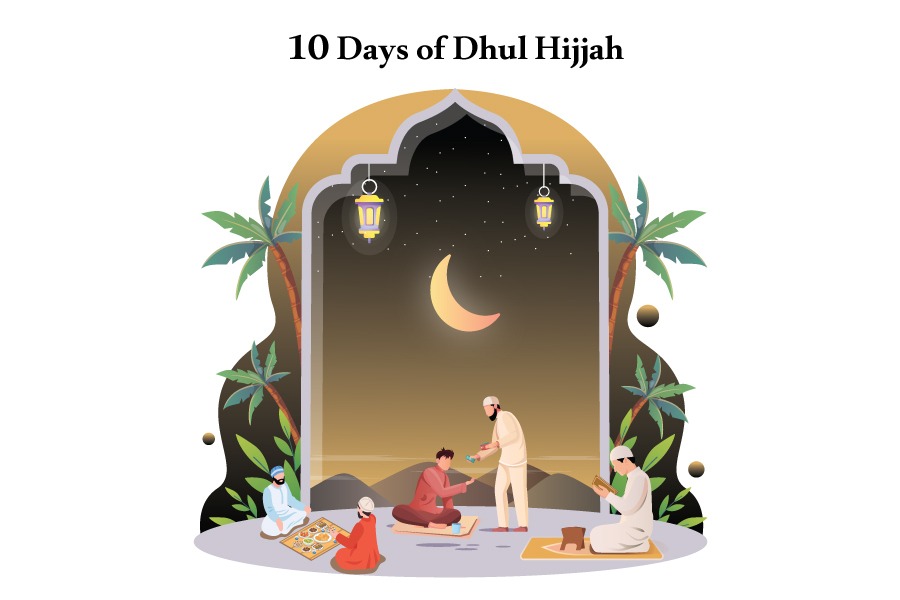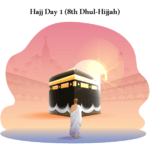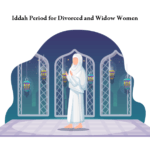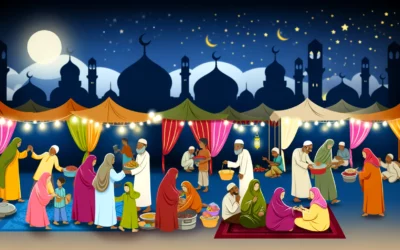The Islamic calendar is rich with significant dates and periods that hold great religious importance for Muslims worldwide. One such period is the “10 days of Dhul Hijjah,” which is considered to be among the holiest times of the year. In this article, we will explore the significance and what to do on this 10-day of Dhul Hijjah.
Importance of the 10 days of Dhul Hijjah
Dhul Hijjah is the last month of the Islamic lunar calendar. It holds immense significance for Muslims around the world, as it marks the period when the annual Hajj pilgrimage takes place in the holy city of Mecca. The 10 days of Dhul Hijjah precede the culmination of the Hajj pilgrimage and hold great spiritual rewards and blessings for Muslims
The 10 days of Dhul Hijjah are a blessed period, often mentioned as the best ten days of the year.
The Prophet (SAW) said:
“There are no days on which righteous deeds are more beloved to Allah than these 10 days.” {Bukhari}
They are mentioned in the Quran and numerous hadiths as a time of increased devotion and worship. Muslims are encouraged to engage in acts of piety and strive for spiritual growth during this sacred period.
It is stated in the Surah Fajr
وَلَيَالٍ عَشْرٍۢ
and the ten nights,
وَٱلشَّفْعِ وَٱلْوَتْرِ
and the even and the odd,
(AlQuran 89:2-3)
What to do in the first 10 Days of Dhul Hijjah?
The 10 days of Dhul Hijjah provide an opportunity for Muslims to engage in personal reflection and spiritual growth. It is a time to assess one’s actions, seek forgiveness, and strive to become a better person. Muslims are encouraged to set aside moments for introspection, connect with their inner selves, and develop a stronger bond with Allah. Let’s explore the various acts of worship and charity that Muslims engage in during this sacred period.
-
Recitation of the Quran:
Muslims are encouraged to increase their recitation of the Quran during the 10 days of Dhul Hijjah. By engaging in the recitation of the holy book, individuals can reflect on its teachings, seek guidance, and connect with the words of Allah.
-
Extra Prayers (Nafl Salah):
Alongside the obligatory daily prayers, perform additional voluntary prayers known as Sunnah and nafl prayers. The Prophet Muhammad (peace be upon him) would often perform these prayers, and they carry great rewards and blessings. You can offer these prayers individually or in congregational settings.
-
Observe Fasting:
Fasting during the first 10 days of Dhul Hijjah, especially on the ninth day (the Day of Arafah), is highly recommended. The Prophet Muhammad (peace be upon him) said that fasting on the Day of Arafah expiates sins of the previous year and the upcoming year.
Fasting on the day of `Arafah expiates the sins of two years: the past one and the coming one.
(Hadith | Muslim)
However, if you are performing Hajj, it is not recommended to fast on the Day of Arafah as it is a day of intense physical exertion.
-
Engage in Dhikr and Takbeer:
Increase your remembrance of Allah by reciting phrases of praise, glorification, and supplication. The most common phrase is “Allahu Akbar” (Allah is the Greatest), known as Takbeer. Recite this Takbeer abundantly throughout the 10 days of Dhul Hijjah, as it is a form of glorification and a reminder of the greatness of Allah.
-
Seeking Forgiveness:
Take time during these blessed days to reflect upon your actions and seek forgiveness from Allah for any sins or shortcomings. Engage in sincere repentance, acknowledging your mistakes, and making a firm intention to improve yourself. Use this period of self-reflection to strengthen your relationship with Allah and seek His mercy and forgiveness
-
Charitable Acts:
Acts of charity hold immense rewards during these blessed days. Muslims are encouraged to give generously to those in need, whether through monetary donations, providing food to the hungry, or supporting charitable organizations. The act of giving not only benefits those in need but also purifies one’s wealth and strengthens the spirit of compassion and empathy.
-
Visiting the Sick and Elderly:
It is highly recommended to visit the sick and elderly, offering them support, comfort, and prayers. Showing kindness and care to the vulnerable members of society is an act of worship that is greatly rewarded during the 10 days of Dhul Hijjah.
-
Spreading Goodness:
Engaging in acts of kindness, such as helping others, showing gratitude, offering sincere compliments, and resolving conflicts, is highly encouraged. These acts contribute to creating a positive and harmonious environment and bring joy to those around us.
-
Dua (Supplication):
Muslims are encouraged to engage in extensive dua, or supplication, during the 10 days of Dhul Hijjah. They can seek Allah’s blessings, guidance, and forgiveness, and make specific prayers for their well-being, the well-being of their loved ones, and the ummah (Muslim community) as a whole.
Conclusion
The 10 days of Dhul Hijjah are a remarkable period filled with spiritual significance and divine blessings. By actively participating in these acts of worship and charity, Muslims can maximize the benefits of the 10 days of Dhul Hijjah. It is a time to strive for spiritual growth, strengthen the connection with Allah, and exemplify the values of compassion, generosity, and humility
FAQs (Frequently Asked Questions)
1. What are the 10 days of Dhul Hijjah?
The 10 days of Dhul Hijjah are the final ten days of the Islamic lunar calendar, preceding the celebration of Eid al-Adha. They are considered to be the most blessed and significant days of the year.
2. Can non-pilgrims benefit from the 10 days of Dhul Hijjah?
Absolutely! Non-pilgrims can engage in various acts of worship, fasting, and charity during these days to seek Allah’s blessings and forgiveness.
3. Why is fasting on the Day of Arafah important?
Fasting on the Day of Arafah removes sins from the previous year and the year to come. It is highly recommended for Muslims, even if they are not performing Hajj.
4. How can one make the most of the 10 days of Dhul Hijjah?
By engaging in acts of worship, seeking forgiveness, performing extra prayers, reciting the Quran, and engaging in charity, Muslims can make the most of these blessed days and experience spiritual growth.

















